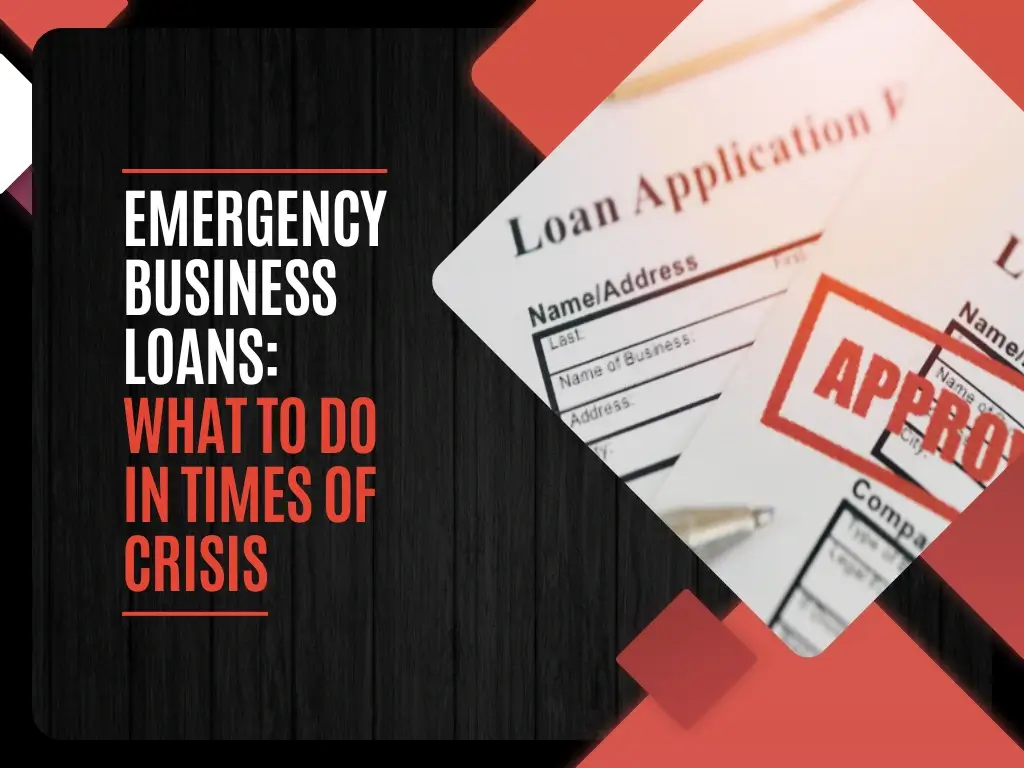Emergency Business Loans: What to Do in Times of Crisis
Learn how to secure emergency business loans quickly during a crisis and keep your business afloat with these essential steps.

During times of crisis, companies face unpredictable difficulties. These could be due to an abrupt fall in income, natural calamities, or healthcare crises—events that can seriously strain a company’s financial stability. For instance, in 2020, the world pandemic resulted in 700,000 businesses closing their doors, leading to the loss of 3 million jobs.
Although numerous enterprises endeavor to keep emergency funds available, the truth is that not all can predict or sufficiently plan for these types of scenarios. This is the point where emergency business loans become important, offering the needed financial support to survive in difficult times. Nevertheless, understanding when and how to use these loans may be very significant for your business’s survival.
Fast Business Loans: A Quick Solution for Urgent Needs
When disaster strikes, time is of the essence. Lots of entrepreneurs lack the convenience of waiting several weeks or months for standard loan approvals. In these situations, fast business loans are a feasible alternative. These loans are created to give fast capital access, usually within 24 to 48 hours. This allows companies to deal with instant financial difficulties. If you have pending bills from suppliers, payroll expenses, or operational costs that need immediate attention, fast loans can stop a short-term problem from turning into a long-lasting disaster.
Lenders that offer fast business loans usually simplify the process of application. Online applications, less paperwork, and speedy approvals make it more convenient for businesses to get funds rapidly. To make smarter financial decisions, business owners can also use helpful tools like business calculators to estimate loan costs and repayment terms before committing. Nonetheless, business owners must pay attention to the terms and conditions coming with these loans. Fast loans might have higher interest rates or less time to repay, and this could put more financial pressure on your business if you don’t handle it with caution. So even though these loans provide swift solutions, they must be included in a wide-ranging economic plan for long-term steadiness.
Types of Emergency Business Loans Available
All emergency business loans are not made the same. Your business’s particular needs and financial status can determine which loan options you have access to. Every kind of loan provides various advantages and compromises; therefore, knowing what is accessible becomes crucial.
- Term loans: They are usual loans having a settled payment plan. Companies get the total amount at once and over a period return it with added interest. Term loans may be helpful for bigger, one-time costs like replacing equipment or significant repairs after a disaster.
- Credit lines for business: This adaptable loan choice permits companies to pull upon funds as required up to a fixed credit boundary, similar to a credit card. A business line of credit is especially helpful during crises since it continually supplies capital without the necessity of applying again and again for many loans.
- SBA disaster loans: Guaranteed by the Small Business Administration (SBA), these loans are created with the special aim of assisting businesses in recovering from physical or economic harm brought about by disasters. The conditions for SBA disaster loans tend to be more advantageous compared to traditional emergency loans, featuring low interest rates and long-term repayment plans.
- Merchant cash advances: This type of financing option gives businesses the chance to take loans according to future sales, usually from credit card deals. The repayment is done by taking some portion of daily sales until the advance money is fully paid back. Although getting merchant cash advances is simple, they usually come at a higher price and should be thought about thoroughly.
When you assess these choices, you have the opportunity to identify the appropriate kind of loan that fits well with your business requirements and repayment ability. This is done in such a way that it won’t place too much burden on your cash flow.
Evaluating Your Business’s Financial Health Before Taking a Loan
Before you plunge into an emergency loan, it is crucial to evaluate the financial health of your business. Checking your cash flow, obligations, and overall debt burden can help in deciding if assuming more debt is a good choice or should other strategies be considered as alternatives.
First, take a look at your cash flow to understand the current and upcoming monetary commitments of your company. Having a solid grasp on your expenses will help you figure out exactly how much you really need to borrow and what type of repayment setup is viable. Companies that are presently deep in debt might have to contemplate tweaking current conditions or merging loans prior to requesting extra finances.
It is also important to consider how a new loan will affect your credit standing. While emergency loans can assist you during hard times, not paying them back timely could harm your credit rating and make it harder to get funds in the future. This might have lasting effects, particularly if later on, your business needs capital for expansion.
Alternative Funding Sources to Consider
Emergency loans are not the sole choice for businesses in need, they work well but other options exist too. Your situation can determine various funding sources that could help without increasing your debt.
Government Grants
In specific crises, like natural disasters or economic downturns, governments can provide businesses with grants. These are different from loans because they don’t need to be paid back and this makes them a more appealing choice for business owners. Remember that grants can be competitive and might require time to process. Thus, they may not offer the instant funds you need.
Crowdfunding
Few companies now employ crowdfunding platforms for obtaining urgent financial help. Telling your story to prospective sponsors might draw contributions or investments from those who endorse your enterprise. Even though it’s not a promised solution, crowdfunding might bring in a rush of money with almost no risk.
Agreements With Vendors and Suppliers
During crisis periods, numerous companies negotiate with suppliers and vendors for more advantageous terms. Lengthening the time limit of payment or accepting to plan by installment can lessen instant financial stress without obtaining new debt.
These different choices might not be sufficient to cater to all your requirements every time, but they can add to emergency loans. This helps distribute the financial responsibility and decrease aggregate borrowing.
Planning for the Future: Establishing an Emergency Fund
After your company has successfully dealt with a crisis, it becomes crucial to take measures for protection against upcoming emergencies. The most beneficial method of getting ready for unpredicted situations is through the establishment of an emergency fund. This particular fund must contain enough money equivalent to three to six months’ operating costs, providing financial security for your business during challenging moments.
Begin by putting a part of your earnings each month into a special emergency fund. Even minor deposits can accumulate over time, creating a safety net for use in case of financial difficulties. Also, examine your spending routinely to locate places where you could reduce expenses and boost savings.
Actively handling your company’s financial matters and setting up a crisis fund can lessen your dependence on emergency borrowing, bringing you peace of mind in unpredictable times.
Bottom Line
Unexpected troubles can hit suddenly, causing heavy pressure on a company’s financial situation. Emergency business loans can act as an essential support system, offering the needed resources to keep activities going, cover expenses, and bounce back from interferences. Nonetheless, you must approach these credits with a clear insight into your choices, possible terms involved and knowledge of how financially fit your business is. By assessing all possible financing solutions, your company can be more prepared to handle difficulties and become stronger after facing them.





